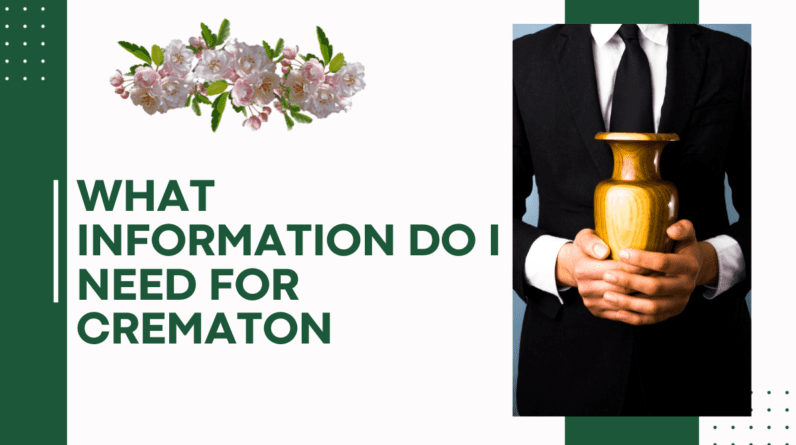
So, you’ve made the decision to consider cremation in Melbourne, FL. Whether it’s for yourself or a loved one, it’s important to have all the necessary information before moving forward with the process. From understanding the legal requirements to choosing a reputable cremation provider, this article will provide you with a comprehensive overview of what you need to know when it comes to cremation in Melbourne, FL. Let’s dive in and ensure you have all the essential information to make informed decisions during this delicate time.

Choosing a Funeral Home
When it comes to planning a cremation in Melbourne, FL, the first step is to find a reputable funeral home. Researching funeral homes in the area is crucial in order to make an informed decision. Start by seeking recommendations from friends, family, or acquaintances who have recently gone through a similar experience. Their personal experiences can provide valuable insights into the quality of service offered by different funeral homes.
Reading reviews and testimonials is also a helpful way to gauge the reputation of a funeral home. Online platforms such as Google reviews or funeral home directories often provide a range of reviews from previous clients. Take note of any recurring themes mentioned in the reviews, both positive and negative. This can give you a better understanding of what to expect from a particular funeral home.
When considering a funeral home for cremation services, it is important to take into account their reputation and experience in handling cremation arrangements. Look for funeral homes that specialize in cremation and have a solid track record in serving the community. A funeral home with extensive experience in cremation can ensure that the process is carried out with the utmost professionalism and care, providing peace of mind during a difficult time.
Understanding Cremation Process
Before proceeding with cremation, it is essential to have a clear understanding of what the process entails. Cremation is a method of disposition that involves the incineration of the deceased body, reducing it to its basic elements, primarily bone fragments. This process takes place in a specially designed cremation chamber, also known as a retort.
The cremation process begins with the body being placed inside the retort, which is then heated to temperatures ranging from 1,400 to 2,000 degrees Fahrenheit. The intense heat and flame break down the body, eventually reducing it to bone fragments. These fragments are then processed into a fine powder called cremains or ashes.
In Melbourne, FL, cremation is legal and widely practiced. However, it is always a good idea to familiarize oneself with any religious or cultural considerations that may impact the decision to choose cremation. Some religious beliefs may have specific guidelines or traditions regarding cremation, so it is important to consult with religious leaders or cultural advisors to ensure that the chosen method of disposition aligns with personal or familial beliefs.
Required Documentation
When arranging for a cremation, there are several important documents that will be needed. These documents serve as legal requirements and help ensure that the cremation process is carried out properly and in accordance with all applicable laws and regulations.
The death certificate is a crucial document that must be obtained before cremation can take place. The death certificate is issued by the attending physician or the medical examiner and certifies the cause and manner of death. This document is necessary to obtain the permit for cremation.
The permit for cremation is another essential document that needs to be obtained. This permit is typically issued by the local government or health department and authorizes the cremation to proceed. It is important to work closely with the funeral home to ensure that all necessary permits are obtained in a timely manner.
An authorization for cremation form is also required. This document grants permission for the funeral home or crematory to proceed with the cremation. It is typically signed by the next of kin or the individual with legal authority over the disposition of the deceased’s remains.
Preparation of the Body
Once the necessary documentation is in order, the funeral home will handle the preparation of the body for cremation. This process includes transporting the body from the place of death to the funeral home. The funeral home will coordinate the logistics of transportation, ensuring that the body is handled with dignity and respect at all times.
Prior to cremation, certain preparations must be made. This may include removing any pacemakers or other medical devices that may interfere with the cremation process. Pacemakers and other devices contain batteries or explosive components that can pose a safety risk during cremation.
Many funeral homes offer the option for family and loved ones to view and identify the deceased prior to cremation. This can provide some closure and emotional support during a challenging time. The funeral home will facilitate this process, ensuring that the viewing is conducted in a respectful and sensitive manner.
Cremation Container Options
When opting for cremation in Melbourne, FL, it is important to consider the type of container that will be used for the cremation process. The container is used to hold the body during cremation and can be made of various materials such as wood, cardboard, or metal.
In Melbourne, FL, the type of container used for cremation can vary depending on the requirements of the funeral home and any regulations in place. Some funeral homes require the use of a specific type of container, while others may have more flexibility in terms of acceptable options.
Personal items can sometimes be placed in the container with the deceased, depending on the funeral home’s policies and local regulations. It is advisable to check with the funeral home regarding their guidelines on personal items. It is important to note that these items will be cremated along with the body and will not be recoverable.
While funeral homes may offer containers for purchase, it is not usually a requirement to buy a container from the funeral home. Families have the option of providing their own suitable container, as long as it meets the necessary specifications.
Cost of Cremation
Understanding the pricing structure for cremation services is essential when making arrangements. The cost of cremation can vary depending on several factors, including the funeral home chosen, the level of service desired, and any additional options or upgrades selected.
When considering the cost of cremation, it is important to inquire about what exactly is included in the quoted price. Basic cremation services typically cover the essential services required for the cremation process, such as transportation, preparation of the body, and the actual cremation itself. Additional services, such as a memorial service or the purchase of an urn, may incur additional costs.
It is also important to inquire about any potential additional fees or expenses that may arise during the cremation process. For example, there may be charges for obtaining necessary permits, filing paperwork, or purchasing an urn. By understanding the full cost breakdown, you can make an informed decision and avoid any unexpected financial surprises.
Choosing an Urn
Selecting an urn to hold the cremated remains is an important part of the cremation process. Urns come in various shapes, sizes, materials, and designs, allowing for personalization and customization. Understanding the different types of urns available can help in selecting one that reflects the unique personality or interests of the deceased.
Some common types of urns include metal urns, wooden urns, ceramic urns, and biodegradable urns. Metal urns are often durable and can come in a variety of finishes, while wooden urns exude a natural aesthetic. Ceramic urns can be handcrafted and can showcase intricate designs, while biodegradable urns are eco-friendly options that can be used for scattering or burial.
Considerations for choosing an urn include the size, as it should be suitable for holding the entire volume of cremated remains. Material and design should also be taken into account, as personal preferences and the intended final disposition of the urn may influence the choice.
Personalizing the urn is another option that can provide a meaningful tribute to the deceased. Many funeral homes offer engraving or customization services, allowing for the addition of names, dates, quotes, or symbols that hold special significance.
Cremation Timing and Scheduling
One question that often arises when planning a cremation is how long the process takes. The cremation process itself typically takes several hours, but additional time may be required for paperwork, transportation, and scheduling.
Scheduling the cremation service should be done in coordination with the funeral home or crematory. They will provide guidance on available dates and times, ensuring that the cremation can be carried out according to your preferences.
Considerations for out-of-town family and friends should also be taken into account when scheduling the cremation service. Providing advanced notice and options for attending the service remotely or at a later date can help accommodate the needs of those who cannot be physically present.
Memorial Service or Gathering
Deciding whether to hold a memorial service is a personal choice that depends on individual preferences and cultural or religious customs. A memorial service provides an opportunity for family and friends to come together, share memories, and honor the life of the deceased.
When selecting a venue for the memorial gathering, consider spaces that are meaningful or significant to the deceased or their loved ones. This could be a place of worship, a favorite outdoor location, or a community center. The chosen venue should be able to accommodate the expected number of attendees and provide a comfortable and respectful environment for reflection and remembrance.
Planning the details of the memorial service involves determining the program or order of events, selecting readings or music, and inviting speakers or participants. Collaborate with the funeral home and any chosen clergy or celebrant to ensure that the memorial service reflects the desires and preferences of the deceased and their loved ones.
Disposition of Ashes
After the cremation process is complete, a decision must be made regarding the final disposition of the ashes. There are several options available, each with its own considerations and significance.
One option is to bury the ashes in a cemetery. This allows for a permanent resting place that can be visited and adorned with headstones or markers. Cemeteries often have specific sections or gardens dedicated to the interment of ashes, providing a peaceful and serene environment for remembrance.
Scattering the ashes in a meaningful location is another option. This could be a favorite spot of the deceased, such as a beach, hiking trail, or garden. It is important to check local regulations and obtain any necessary permits when choosing this option.
Keeping the ashes in an urn is a common choice for those who wish to keep their loved one close. Urns can be placed in a specially designated area of the home, such as a memorial shelf or a dedicated space. Some families also choose to divide the ashes among multiple smaller urns, allowing for different family members to hold a portion of the remains.
In conclusion, choosing a funeral home, understanding the cremation process, gathering the required documentation, preparing the body, selecting a cremation container, considering the cost, choosing an urn, scheduling the cremation, planning a memorial service, and deciding on the final disposition of ashes are all important aspects to consider when arranging a cremation in Melbourne, FL. It is crucial to approach each decision with care and thoughtfulness, honoring the wishes and values of the deceased while finding solace and closure for yourself and your loved ones.






